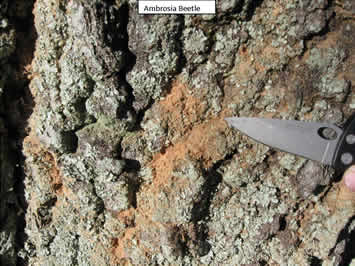 Description: The immature, or larval stage of insects, particularly beetles and moths, that feed on wood rather than leaves or plant juices are referred to as borers. All woody parts of the tree, including buds, twigs, trunk and roots, are susceptible to borer attack. Most borers are ‘secondary pests’ – attracted to trees that have been weakened through drought, injury or disease. There are a few ‘primary pest’ borers that can successfully attack healthy trees, in particular the ‘clear-wing borers’.
A large number of beetles and moths begin life as wood borers in their larval stage. When fully grown, usually 1-2 years, the adult cuts an oval exit hole in the bark and emerges. The adult stage is mostly spent flying to new host trees, mating and laying eggs.
Eggs of most shade tree borers are laid on the bark, in small cracks. Eggs typically hatch within one to two weeks and the newly emerged borers chew through the bark. Their development takes place just under the bark and in the wood. As the borers tunnel in the tree, they make meandering tracks packed with fibrous boring dust. Sawdust like frass (excrement) may be around an exit hole or in a pile on the ground.
Symptoms: Insect borers can be serious aesthetic, economic and structural pests of trees. The severity of plant damage depends on the number and location of insects in the plant tissue. A few borers can produce necrotic lesions. Many borers can encircle a stem and kill a branch or entire tree. Borers in the twigs and shoots decrease fruit, nut and seed production by causing branch dieback. Wood and bark riddled with holes decrease the aesthetic value of plants.
Action: Once borers have infested a tree, they can be difficult to control. Insecticidal sprays on the trunk can be successful only if they are applied when adults are laying eggs. Systemic insecticides, applied in a soil drench, can be applied shortly before or at the onset of the first egg hatch. Systemic insecticides are not effective against any borer that will develop into a moth, however.
Thank you for reviewing this information. Schneider Tree Care is committed to preserving and enhancing the quality of your property through tree care education and services. We employ professionally trained and certified arborists who are available to meet with you for a consultation at no charge.
If you have any questions or need additional information regarding the health of your trees, please contact us.
Description: The immature, or larval stage of insects, particularly beetles and moths, that feed on wood rather than leaves or plant juices are referred to as borers. All woody parts of the tree, including buds, twigs, trunk and roots, are susceptible to borer attack. Most borers are ‘secondary pests’ – attracted to trees that have been weakened through drought, injury or disease. There are a few ‘primary pest’ borers that can successfully attack healthy trees, in particular the ‘clear-wing borers’.
A large number of beetles and moths begin life as wood borers in their larval stage. When fully grown, usually 1-2 years, the adult cuts an oval exit hole in the bark and emerges. The adult stage is mostly spent flying to new host trees, mating and laying eggs.
Eggs of most shade tree borers are laid on the bark, in small cracks. Eggs typically hatch within one to two weeks and the newly emerged borers chew through the bark. Their development takes place just under the bark and in the wood. As the borers tunnel in the tree, they make meandering tracks packed with fibrous boring dust. Sawdust like frass (excrement) may be around an exit hole or in a pile on the ground.
Symptoms: Insect borers can be serious aesthetic, economic and structural pests of trees. The severity of plant damage depends on the number and location of insects in the plant tissue. A few borers can produce necrotic lesions. Many borers can encircle a stem and kill a branch or entire tree. Borers in the twigs and shoots decrease fruit, nut and seed production by causing branch dieback. Wood and bark riddled with holes decrease the aesthetic value of plants.
Action: Once borers have infested a tree, they can be difficult to control. Insecticidal sprays on the trunk can be successful only if they are applied when adults are laying eggs. Systemic insecticides, applied in a soil drench, can be applied shortly before or at the onset of the first egg hatch. Systemic insecticides are not effective against any borer that will develop into a moth, however.
Thank you for reviewing this information. Schneider Tree Care is committed to preserving and enhancing the quality of your property through tree care education and services. We employ professionally trained and certified arborists who are available to meet with you for a consultation at no charge.
If you have any questions or need additional information regarding the health of your trees, please contact us. 




